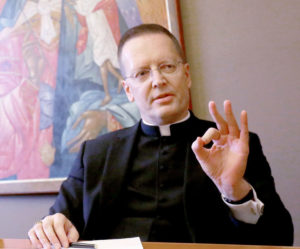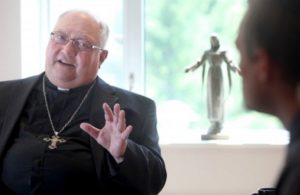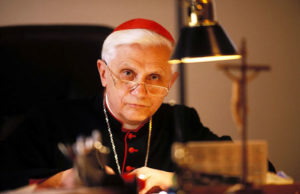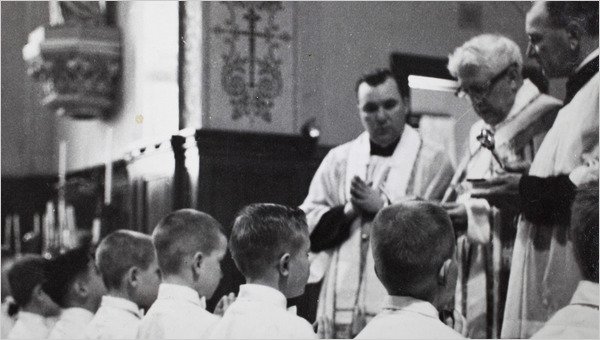The Notorious Bishop Robert Morlino
Bishop Robert Morlino was appointed by Pope John Paul II as the 4th bishop of Madison, Wisconsin on May 23, 2003. The “good news” for Madison Catholics is that he turns 75 on December 31, 2021. They just need to hang on and run out the clock.
On October 21, 2017, his vicar general, Rev. Msgr. James Bartylla, emailed diocesan priests on “Consideration of Funeral Rites for a Person in a Homosexual Civil or Notorious Union.” Though it was sent from the vicar general, the communication had the approval of Bishop Morlino. 
Priests should not mention the name of the surviving partner, nor make any reference to the “unnatural union” if funeral rites are provided for someone in a same-sex relationship. In addition, priests should keep in mind the “attitude” of the family toward the church, whether the deceased or surviving partner was a “promoter of the gay lifestyle,” and whether the deceased person had shown “signs of repentance before death.”
Predictably, this has caused a stink. Even a few bishops weighed in on the opposite direction–something that rarely occurs in their “collegiality” culture.
Bishop Morlino and Msgr. Bartylla have not extended the funeral ban to any other sexual activity the church finds sinful or shameful–rape, incest, adultery, pornography, prostitution, molestation–by clergy or laity to children, young people or adults. The only ban is to lesbians and gays in a civil marriage.
In this 13 years as bishop of Madison, Morlino has regularly detonated controversy bombs. 
In 2004, six months after arriving in Madison, he came out swinging in the Catholic Herald newspaper. Morlino stated that Madison existed below a “moral minimum” and that they city had “virtually no public morality.” He specifically cited the city’s StageQ community theater–a lesbian and gay troupe–as evidence of this view.
But the worst episode was his reaction to a March 2010 New York Times expose of the Vatican handling of the Rev. Lawrence C. Murphy. Father Murphy is believed to have molested hundreds of boys between 1950 and 1974 while assigned to a Milwaukee area school for the deaf. In the late ’90s, the Congregation for the Doctrine of the Faith, a Vatican office headed by then-Cardinal Joseph Ratzinger–the future Pope Benedict XVI–stopped attempts by Milwaukee Archbishop Rembert Weakland and Cardinal Bertone of the CDF to defrock the priest.
Bishop Morlino, who ripped Madison’s lack of “public morality” rushed to the defense of Pope Benedict XVI’s management of the Fr. Murphy sex abuse complaint–
“As the Church in Europe now uncovers some of the sins committed by its clergy members, the mass media was trying, with every fiber of their being to make Pope Benedict XVI look guilty. Their big line is, ‘what did the Pope know and when did he know it?’ That is, ‘he’s to be treated like any other politician; he’s probably corrupt, and it’s our role to uncover his corruption.'”
And he goes on…
“Of course, many see their role as to destroy the Church of Christ, the Catholic Church. They want us out of the way. So, a very good way to attack the Church is to attack the Holy Father himself. These same people who demand to know what the Pope knew and when he knew it want to place the responsibility for the acts of others (undertaken far away and in different time periods), at the feet of the Pope and make him responsible.”
He chides the “disobedient people” demanding accountability…
“In order to be responsible for something, one has to have the authority to do something about it. And the very people who want to make the Holy Father responsible for everything heinous in the sexual misconduct scandal are the least likely to accept the Pope’s authority in any matter. They are the most disobedient people, in general. Yet they want to lay all the responsibility at the Pope’s feet. That simply makes no sense and we should not be fooled.”
Bishop Morlino contended it was church officials in Milwaukee, not the Vatican, who controlled what happened with Fr. Murphy. “It is clear the Congregation for the Doctrine of the Faith, of which Cardinal Ratzinger was then at the head, had nothing to do with the criminal case of the sickening abuse by Fr. Lawrence Murphy of several young deaf men.”
According to the New York Times, in 1993, with complaints about Fr. Murphy stacking up, Archbishop Weakland hired a social worker specializing in treating sexual offenders to evaluate him. After four days of interviews, the social worker said that Fr. Murphy had admitted his acts, had probably molested about 200 boys and felt no remorse.
In 1996 Archbishop Weakland sent two letters to Cardinal Ratzinger, and one to the Apostolic Signatura, the church’s highest court, asking for guidance on whether to conduct a canonical trial of Father Murphy. Archbishop Weakland wanted Murphy defrocked.
The Congregation for the Doctrine of the Faith had oversight of the case because Father Murphy was suspected of using the confessional to commit his crimes — a crime that is considered particularly serious under the church’s canon law because confession is a sacrament.
a href=”https://nihilobstat.info/wp-content/uploads/2017/11/cardinal-joseph-ratzinger.jpg”>
In 1998, Fr. Murphy, who was dying, wrote to Cardinal Ratzinger asking for clemency. “I simply want to live out the time that I have left in the dignity of my priesthood. I ask your kind assistance in this matter.” Cardinal Ratzinger’s office moved to halt the defrocking process. Fr. Murphy died later in that year. An auxiliary bishop of Milwaukee celebrated his funeral Mass, and he was buried in his priestly vestments.
What moral lesson should we take from all of this?

